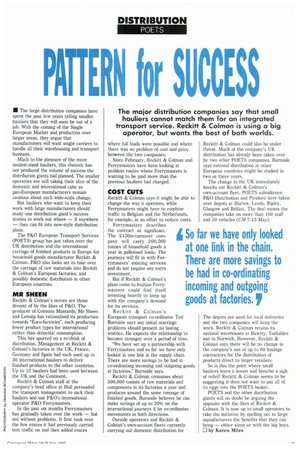PATTERN for SUCCESS
Page 41

If you've noticed an error in this article please click here to report it so we can fix it.
• The large distribution companies have spent the past few years telling smaller hauliers that they will soon be out of a job. With the coming of the Single European Market and production over larger areas, they argue that manufacturers will want single carriers to handle all their warehousing and transport business.
Much to the pleasure of the more modest-sized hauliers, this rhetoric has not produced the volume of success the distribution giants had planned, The smaller operators are still taking their slice of the domestic and international cake as pan-European manufacturers remain cautious about such wide-scale change.
But hauliers who want to keep their work with large manufacturers should study one distribution giant's success stories to work out where — if anywhere — they can fit into new-style distribution plans.
The P&O European Transport Services (POETS) group has just taken over the UK distribution and the international carriage of finished products in Europe for household goods manufacturer Reckitt & Colman. P&O also looks set to take over the carriage of raw materials into Reckitt & Colman's European factories, and possibly domestic distribution in other European countries.
Reckitt & Colman's moves are those dreamt of by the likes of P&O. The producer of Co[mans Mustards, Mr Sheen and Lemsip has rationalised its production towards "Euro-factories", each producing fewer product types for international rather than domestic consumption.
This has spurred on a re-think of distribution. Management at Reckitt & Colman's factories in the UK, France, Germany and Spain had each used up to 30 international hauliers to deliver finished products to the other countries. Up to 10 hauliers had been used between the UK and the Continent.
Reckitt & Colman staff at the company's head office at Hull persuaded the transport management to sack their hauliers and use P&O's international operator P&O Ferrymasters.
In the past six months Ferrymasters has gradually taken over the work — but not without problems, It first took over the few routes it had previously carried test traffic on and then added routes where full loads were possible and where there was no problem of cost and price between the two companies.
Since February, Reckitt & Colman and Ferrymasters have been looking at problem routes where Ferrymasters is wanting to be paid more than the previous hauliers had charged.
Reckitt & Colman says it might be able to change the way it operates, while Ferrymasters might have to combine traffic to Belgium and the Netherlands, for example, in an effort to reduce costs.
Ferrymasters describes the contract as significant. The £130m-turnover company will carry 200,000 tonnes of household goods a year in palletised loads. The journeys will fit in with Ferrymasters' existing services and do not require any extra investment.
But if Reckitt & Colman's plans come to fruition Ferrymasters could find itself investing heavily to keep up with the company's demand for its services.
Reckitt & Colman's European transport co-ordinator Ted Burnside says any initial marriage problems should present no lasting worries. He expects the relationship to become stronger over a period of time.
"We have set up a partnership with Ferrymasters and so far we have only looked at one link in the supply chain. There are more savings to be had in co-ordinating incoming and outgoing goods at factories," Burnside says.
Reckitt & Colman consumes about 500,000 tonnes of raw materials and components in its factories a year and produces around the same tonnage of finished goods. Burnside believes he can make savings of up to 2096 on the international journeys if he co-ordinates movements in both directions.
Outside operators and Reckitt & Colman's own-account fleets currently carrying out domestic distribution for Reckitt & Colman could also be under threat. Much of the company's UK distribution has already been taken over by two other POETS companies. Burnside says national distribution in other European countries might be studied in two or three years.
The change in the UK immediately knocks out Reckitt & Colman's own-account fleet. POETS subsidiaries P&O Distribution and Pandora have taken over depots at Harlow, Leeds, Ripley, Glasgow and Belfast. The deal means the companies take on more than 100 staff and 50 vehicles (CM 7-13 May).
The depots are used for local deliveries and the two companies will keep the work. Reckitt & Colman retains its national warehouses at Bawtry, Yorkshire and in Norwich. However, Reckitt & Colman says there will be no change in the company's use of up to 60 haulage contractors for the distribution of products direct to larger retailers.
So is this the point where small hauliers learn a lesson and breathe a sigh of relief? Reckitt & Colman seems to be suggesting it does not want to put all of its eggs into the POETS basket.
POETS and the other distribution giants will no doubt be arguing the opposite with the likes of Reckitt & Colman, It is now up to small operators to take the initiative by spelling out to large manufacturers the benefits that they can bring — either alone or with the big boys. 11 by Karen Miles




















































































